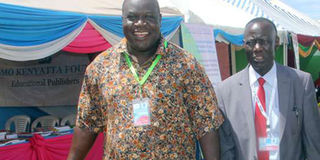New education system to improve learning

Kenya Institute of Curriculum Development director Julius Jwan (left) and other education stakeholders attend a meeting at Sheikh Zayed hall in Mombasa on August 8, 2016. Jwan has welcome the new education curriculum. PHOTO | LABAN WALLOGA | NATION MEDIA GROUP
What you need to know:
- The curriculum will replace the Standard One to Form Four with Grade 1 to 12.
- The proposed basic education curriculum framework is being piloted in various schools.
Learners will no longer be sitting the Kenya Certificate of Primary Education examination once the new curriculum is rolled out.
Kenya Institute of Curriculum Development director Julius Jwan on Sunday said pupils would instead be taking continuous assessment tests.
“National examinations eliminate children from the system and declare them failures when they are hardly 18,” Dr Jwan said when he launched the Digital Literacy Programme at St Joseph’s Busia Girls’ Primary School.
LAPTOP PROJECT
The government expects to issue 980,848 tablet computers to 21,729 schools countrywide.
So far, 18,069 primary schools have received the gadgets.
The tablets are part of the government’s flagship projects expected to enhance teaching and learning.
TRAINING
The curriculum will replace the Standard One to Form Four with Grade 1 to 12.
So far, close to 2,000 teachers have been trained on the new curriculum, which was developed by a team of experts that relied on a needs assessment study.
The study on early childhood development, primary and secondary education was undertaken in January last year and its findings discussed during a national conference on March 30, 2016.
LEARNING
The proposed basic education curriculum framework is also being piloted in various schools.
Dr Jwan said the national digital literacy would increase as teachers and learners use ICT skills to search for, analyse, integrate, manage and evaluate information
“The devices are not meant to replace a teacher but to complement and make delivery of content more exciting and practical,” he said.
VISION 2030
He added that the curriculum would reduce the volume of homework and allow more play time for children.
ICT Authority project manager Thomas Odhiambo said the programme focuses on the country’s long-term vision of creating a knowledge-based economy in line with the development plan.
“The project is being implemented through a multi-stakeholder approach that involves different ministries and state corporations,” he said.
UNDERSTAND
KICD said it developed the education content uploaded on the hand-held computers according to the curriculum requirements.
Dr Jwan added that the language of instruction in the devices had been simplified for ease of understanding.





